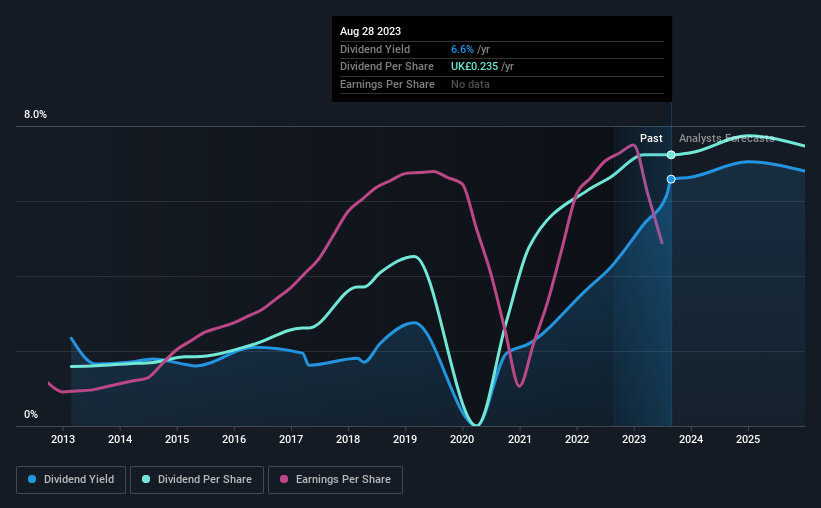Only Two Days Left To Cash In On Robert Walters' (LON:RWA) Dividend
Readers hoping to buy Robert Walters plc (LON:RWA) for its dividend will need to make their move shortly, as the stock is about to trade ex-dividend. The ex-dividend date is usually set to be one business day before the record date which is the cut-off date on which you must be present on the company's books as a shareholder in order to receive the dividend. The ex-dividend date is an important date to be aware of as any purchase of the stock made on or after this date might mean a late settlement that doesn't show on the record date. This means that investors who purchase Robert Walters' shares on or after the 31st of August will not receive the dividend, which will be paid on the 29th of September.
The company's next dividend payment will be UK£0.065 per share, on the back of last year when the company paid a total of UK£0.23 to shareholders. Looking at the last 12 months of distributions, Robert Walters has a trailing yield of approximately 6.6% on its current stock price of £3.57. We love seeing companies pay a dividend, but it's also important to be sure that laying the golden eggs isn't going to kill our golden goose! So we need to investigate whether Robert Walters can afford its dividend, and if the dividend could grow.
View our latest analysis for Robert Walters
Dividends are typically paid out of company income, so if a company pays out more than it earned, its dividend is usually at a higher risk of being cut. Robert Walters is paying out an acceptable 64% of its profit, a common payout level among most companies. A useful secondary check can be to evaluate whether Robert Walters generated enough free cash flow to afford its dividend. It distributed 40% of its free cash flow as dividends, a comfortable payout level for most companies.
It's encouraging to see that the dividend is covered by both profit and cash flow. This generally suggests the dividend is sustainable, as long as earnings don't drop precipitously.
Click here to see the company's payout ratio, plus analyst estimates of its future dividends.
Have Earnings And Dividends Been Growing?
When earnings decline, dividend companies become much harder to analyse and own safely. If business enters a downturn and the dividend is cut, the company could see its value fall precipitously. So we're not too excited that Robert Walters's earnings are down 2.4% a year over the past five years.
Many investors will assess a company's dividend performance by evaluating how much the dividend payments have changed over time. Robert Walters has delivered 16% dividend growth per year on average over the past 10 years. That's interesting, but the combination of a growing dividend despite declining earnings can typically only be achieved by paying out more of the company's profits. This can be valuable for shareholders, but it can't go on forever.
To Sum It Up
Should investors buy Robert Walters for the upcoming dividend? We're not enthused by the declining earnings per share, although at least the company's payout ratio is within a reasonable range, meaning it may not be at imminent risk of a dividend cut. In summary, while it has some positive characteristics, we're not inclined to race out and buy Robert Walters today.
With that being said, if dividends aren't your biggest concern with Robert Walters, you should know about the other risks facing this business. In terms of investment risks, we've identified 2 warning signs with Robert Walters and understanding them should be part of your investment process.
Generally, we wouldn't recommend just buying the first dividend stock you see. Here's a curated list of interesting stocks that are strong dividend payers.
Have feedback on this article? Concerned about the content? Get in touch with us directly. Alternatively, email editorial-team (at) simplywallst.com.
This article by Simply Wall St is general in nature. We provide commentary based on historical data and analyst forecasts only using an unbiased methodology and our articles are not intended to be financial advice. It does not constitute a recommendation to buy or sell any stock, and does not take account of your objectives, or your financial situation. We aim to bring you long-term focused analysis driven by fundamental data. Note that our analysis may not factor in the latest price-sensitive company announcements or qualitative material. Simply Wall St has no position in any stocks mentioned.

